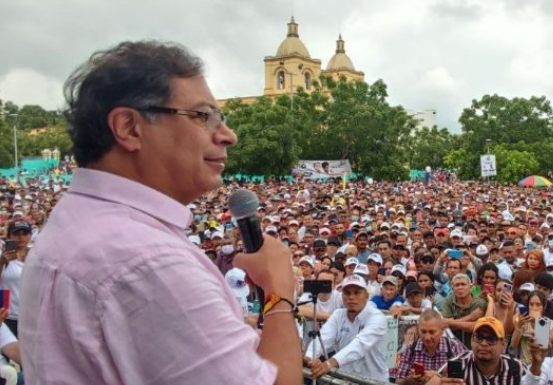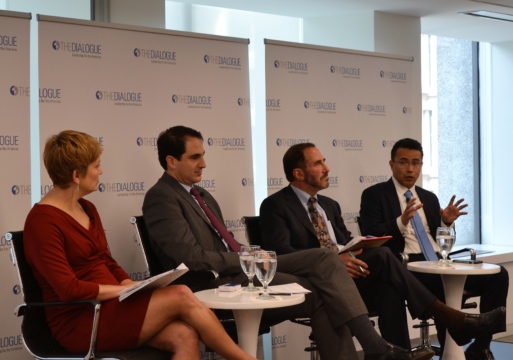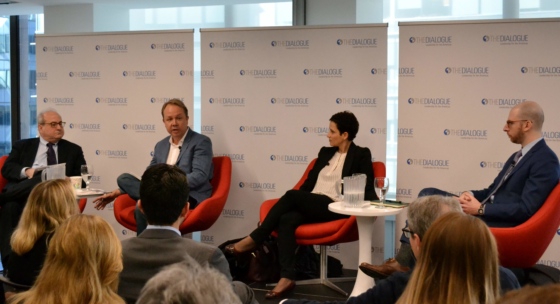
‘Campanha bizarra, cruel e divisiva’, avalia especialista americano
Presidente emérito do Inter-American Dialogue, Peter Hakim diz que maioria republicana sabe que Hillary é provável vencedora.
A Daily Publication of The Dialogue
BOGOTÁ—Just days ahead of Colombia’s presidential election on Sunday, polls show leftist senator and former M-19 guerrilla Gustavo Petro with a double-digit lead over his closest rivals. In a crowded field, only Petro, center-right former Medellín Mayor Federico “Fico” Gutiérrez and independent populist Rodolfo Hernández, a former mayor of Bucaramanga, are polling in the double digits.
Recent polls show that Petro’s lead has remained a steady 12 to 15 percentage points ahead of Gutiérrez. Pollster Invamer released a survey May 19 showing Petro with 40.6 percent support, down three percentage points from an April 22 poll, while Gutiérrez had 27.1 percent support, up about half a percentage point from April. Hernández’s support jumped to 20.9 percent in the latest survey, up from 13.9 percent in the April poll.
But undecided voters still could play a big role. One recent opinion poll revealed that 14 percent of eligible voters remain uncommitted to a candidate. The candidate who can tap into that rich pool of votes could secure a place in the second-round runoff election.
Among Petro’s opponents, it’s a contest for second place, and Petro does not have the more than 50-percent support needed to win the presidency in the first round, meaning that a runoff on June 19 is all but assured.
“This is a race for second place, as Petro is leading by such a wide margin that the only interesting race at this point is between the second and third place candidates in the first round,” Sergio Guzmán, director of consultancy firm Colombia Risk Analysis, told the Latin America Advisor.
Among the problems that Colombia’s next president will have to tackle are rampant corruption, persistent poverty and hunger, as well as street crime in the cities, illegal armed groups at war with each other in the countryside and a labor market where roughly 40 percent work in the informal sector.
As in previous elections, candidates have rallied their support bases to worry less about issues and more about the implications if the opposing side wins.
“This election in particular will be defined by those who fear a left-leaning government and those who ask for change and fear the continuity of another center-right government,” said Silvana Amaya, a senior analyst for the Americas at Control Risks.
If Petro and Gutiérrez emerge as the top vote-getters in the first round on Sunday, Colombia could elect its first left-wing president in next month’s runoff, Guzmán told the Advisor. “Petro wins, I think quite handily,” he said.
 The Latin America Advisor features Q&A from leaders in politics, economics, and finance every business day. It is available to members of the Dialogue’s Corporate Program and others by subscription.
The Latin America Advisor features Q&A from leaders in politics, economics, and finance every business day. It is available to members of the Dialogue’s Corporate Program and others by subscription.
Presidente emérito do Inter-American Dialogue, Peter Hakim diz que maioria republicana sabe que Hillary é provável vencedora.
Latin America faces many challenges in developing its energy resources and providing clean, affordable and reliable energy. With presidential elections in Brazil, Mexico and Colombia next year, there is considerable uncertainty about future energy policy, as potential candidates in these countries have presented widely varying energy and economic policy platforms.
On February 27, the Inter-American Dialogue partnered with Americas Quarterly (AQ) to host an event moderated by the Dialogue’s Michael Shifter with the participation of Brian Winter from AQ, Monica de Bolle from the Peterson Institute of International Economics, and Roberto Simon from FTI Consulting. This discussion drew from AQ’s January issue, Latin America First?, which explored underlying themes in the region’s election super-cycle. The speakers also addressed the political and economic circumstances facing Brazil’s presidential elections.
 Petro // File Photo: Petro Campaign.
Petro // File Photo: Petro Campaign.

 Video
Video